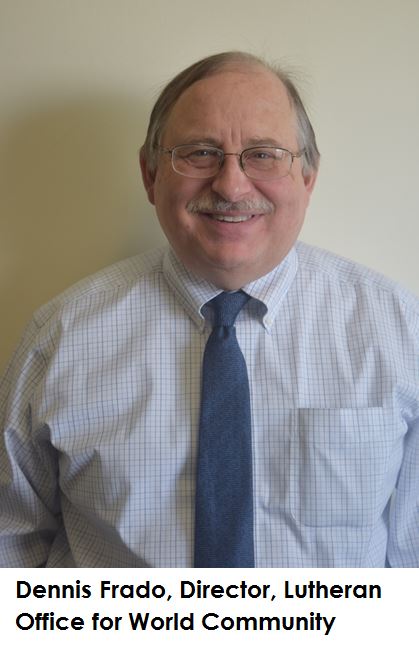 The Gospel liberates from sin, death, and evil and motivates the Church to care for neighbor and the earth.
The Gospel liberates from sin, death, and evil and motivates the Church to care for neighbor and the earth.
– “The Church in Society: A Lutheran Perspective”
Lent always refocuses me on the fact that Jesus made the ultimate sacrifice for us through his death on the cross and his resurrection, which overcame death. The good news of God’s salvation is the gospel. The excerpt above and the one below from the ELCA’s social statement succinctly summarize why I am grateful to have the privilege of a job that calls for engaging every day in advocacy.
The witness of this church in society flows from its identity as a community that lives from and for the Gospel. Faith is active in love; love calls for justice in the relationships and structures of society. It is in grateful response to God’s grace in Jesus Christ that this church carries out its responsibility for the well-being of society and the environment.
Many days here at the United Nations we are confronted with the failures of humanity – war, refugees, seemingly intractable disputes, and horrible violations of human rights. But the loving call to do justice does not grow weary, and we should not either.
Fortunately, we are also able to get to know the work of the peacemakers, the aid workers, the negotiators, and the rights defenders, give thanks for their work and lift them up to others as among those pursuing the better path for the common good. These folks are the ones who thankfully undercut my pessimism and reinforce my hope for a better world. Many, but not all by any stretch, are Christians.
International structures, like all that are the work of humans, are prone to sin. But we are reminded:
God institutes governing authorities, for example, to serve the good of society. This church respects the God-given integrity and tasks of governing authorities and other worldly structures, while holding them accountable to God. …
This church must participate in social structures critically, for sin also is at work in the world. Social structures and processes combine life-giving and life-destroying dynamics in complex mixtures and in varying degrees. This church, therefore, must unite realism and vision, wisdom and courage, in its social responsibility. It needs constantly to discern when to support and when to confront society’s cultural patterns, values, and powers. – “The Church in Society: A Lutheran Perspective”
So, why again are we about this work?
Jesus frees Christians to serve others and to walk with people who are hungry, forgotten, oppressed, and despised. The example of Jesus invites Christians to see people near and far away, people of all races, classes and cultures, friends and strangers, allies and enemies as their “neighbor.” – “The Church in Society: A Lutheran Perspective”
In 2013, The Lutheran World Federation, working with other religious groups, made manifest this understanding by initiating a series of affirmations from the leaders of a wide variety of faith traditions titled “Welcoming the Stranger“:,
A core value of my faith is to welcome the stranger, the refugee, the internally displaced, the other. I shall treat him or her as I would like to be treated. I will challenge others, even leaders in my faith community, to do the same.
It is this kind of effort, this kind of statement of common values crossing many boundaries, where Lutherans have and can continue to make a contribution to that goal stated in the U.N. Charter: “…to promote social progress and better standards of life in larger freedom …” and also offer tangible signs in a myriad of ways of: “… a faith that is active in love, a love that seeks justice, and an insight that strives to discern what is right, good, and fitting…” (The Church in Society: A Lutheran Perspective).
